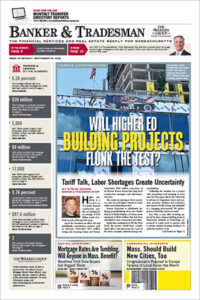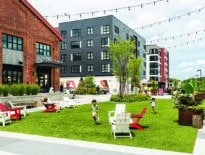
Somerville officials are studying new ideas to slow the exodus of arts and cultural spaces such as Q Division Studios, pictured, from the city amid redevelopment and gentrification. Photo courtesy of Q Division Studios
Brian Charles got the phone call at 5:30 a.m.
A massive fire had broken out at the building that houses his Brighton recording studio, and the call sent him racing to the scene and trudging through ankle-deep water as firefighters struggled to control the eight-alarm blaze in December.
“We sat in lawn chairs all day until the sun went down, watching it burn,” said Charles, a music producer who owns Zippah recording studio on Corey Road.
Zippah is temporarily using space at other local studios to finish producing seven albums while looking for a new home, a process that’s been complicated by the scarcity and high rents of suitable replacements in Boston.
Prospects are looking brighter for The Sound Museum, a Brighton rehearsal space for thousands of local musicians over the decades including the Dropkick Murphys and Letters to Cleo. Developer IQHQ Inc. announced Wednesday it’s hiring a broker and architect to scout replacement locations for The Sound Museum within the city of Boston, as it seeks to redevelop the North Beacon Street property as a life science campus.
But a growing consensus is emerging that individual gestures are no match for gentrifying market forces in Greater Boston, and that municipalities should play a stronger role. Both Boston and Somerville are looking at new requirements for developers, seeking to stem the exodus of rehearsal and performance spaces and recording studios.
A new study by the Metropolitan Area Planning Council recommends that Somerville lift a page from cities such as San Francisco and create a fund to receive in-lieu payments from developers to stabilize or acquire arts properties. Replacing a system that relies heavily on word-of-mouth, it suggests the city create an online matchmaking database for landlords and potential artist tenants.
MAPC inventoried 182 existing arts spaces for risk of displacement and surveyed local artists, 10 percent of whom said they are planning to relocate out of the city. The findings and policy recommendations will be presented at a virtual meeting on Wednesday.
‘Already Behind the Eight Ball’
In Davis Square, a recording studio that’s attracted bookings from Yo-Yo Ma, James Taylor and Aimee Mann is in the midst of a move to Cambridge because of rising rents.
Jon Lupfer and the late Mike Deneen co-founded Q Division Studios in Boston’s South End in 1986. A pending rent increase prompted their move to a commercial building on Highland Avenue in 2000. New ownership that acquired the Somerville property in 2015 sought to rent additional office space to a cybersecurity company, and Q Division’s space search resumed amid a looming 2021 lease expiration.
Lupfer discovered that local real estate had changed dramatically in recent years, with fierce competition for suitable locations.
“If you’re just looking at what gets to market, you’re already behind the eight ball in a hot market like this,” he said.
A friend who owns a commercial property on Rindge Avenue in North Cambridge offered the studio a chance to lease with an option to buy. The buildout is scheduled to be completed this spring.
Word-of-mouth recommendations and sympathetic landlords are critical to Somerville’s arts community, with nearly half of artists telling MAPC they rely on informal agreements or annual leases. Development and rent increases are intensifying, particularly in the Brickbottom and Porter Square areas, the study notes.
A Decade of Zoning Experiments
Somerville has been testing strategies to preserve arts clusters in neighborhoods such as Union Square for over a decade, noted Gregory Jenkins, executive director of the Somerville Arts Council.
In 2019, Somerville added requirements for developers to set aside 5 to 10 percent of commercial floor area for arts and creative enterprises. Boston Mayor Michelle Wu endorsed a similar approach during her campaign.
With 3 million square feet of development at 22 sites under review in Somerville, the existing requirement would generate 275,000 square feet of arts spaces. But some of the spaces are too small to be of practical use, and MAPC recommended adding a buyback to collect in-lieu payments toward arts property acquisitions run by a nonprofit.
And blurred zoning definitions of what constitutes “arts and creative space” have pitted arts groups against other potential tenants such as tech makerspaces and coworking offices, the report noted in recommending a more explicit definition. It also suggests deed restrictions for arts uses and giving artist occupants a right-of-first-refusal if their property comes up for redevelopment.
Jenkins, of the Somerville arts council, suggested the city could give developers density bonuses in exchange for more arts spaces. But he acknowledged competing interests for the ever-more-valuable real estate.
“The community wants more affordable housing, more open space, more access to the new Green Line Station,” he said. “I understand there are a lot of demands on these developers for community needs, but the soul of Somerville as a small start-up creative enterprise area is at an inflection point.”
Will Community Rise from the Ashes?
Zippah studio’s Charles is still smarting at the loss of an estimated $1 million in equipment and personal belongings during the Dec. 17 fire, while scouting the availability of leasable recording space. Special requirements such as soundproofing complicate the process, along with Charles’ desire to find a space that’s located on public transit.

Steve Adams
“There’s a lot of retail space with glass storefronts on busy streets, which is not conducive to the type of businesses we have,” he said. The studio shared the 13,000-square-foot building with Brookline Academy of Dance and Music Maker Studios, which offers private instrumental lessons and is also looking for a new home, Director Bob Brenner said in an email.
“I’m looking at all options,” Charles said. “If there’s a place that’s just a studio, that might be the way we have to go, but I do have a conscious effort to rebuild this arts building community and so I’m trying to find like-minded people who can help us.”
While Wu’s administration has not announced any new anti-displacement measures for arts in Boston to-date, The Sound Museum’s owner, William “Des” Desmond, said he’s been pleased with the communication from his new landlord, IQHQ Inc. The Sound Museum occupies a portion of the existing building, which was acquired by the San Diego lab developer for $50 million in July.
“Unlike a lot of developers, they seem to give a damn,” said Desmond, who founded the studios nearly four decades ago. “Right from the get-go, they said, ‘What do you think the impact is going to be?’ And I said, `It’s going to be tremendous. Can you relocate me?’”





